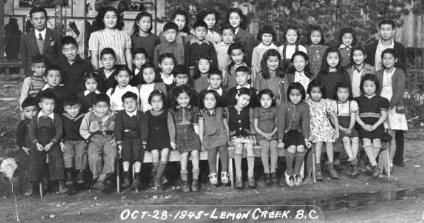

Rafe Mair's Family Secret
– his connection with Japanese Canadians
We
all have family and personal secrets. Things we would rather not
share with strangers. But they also help define the kinds of
people that we become. Rafe Mair, the tough talking right wing
media commentator who served as a cabinet minister in the former Social
Credit provincial governments has recently written to very revealing
articles about his personal connections with the internment of
Japanese-Canadians. I admire him for his stance and the courage
to make these articles public knowledge.
Rafe Mair was the first
person who ever interviewed me on radio. It was in May 1993, and
I had just recieved the Simon Fraser University Terry Fox Gold
Medal. Rafe Mair had a reputation for being a very tough
interviewer. But with me he was very gentle. He has a soft side,
and he shared with me his stories of meeting Terry Fox and Rick
Hansen.
Many years later, I heard him speak about the
challenges he faces going through depression. I was going through
depression at that time too. The doctors told me it was normal
after cancer survival, to have post-traumatic depression. A few
years ago, I had the opportunity to thank him personally for speaking
openly and candidly on his radio show about his depression.
Rafe Mair wrote a letter of support
for the Save Kogawa House campaign last week. In this letter he
revealed that his personal reasons for supporting Kogawa House, as well
as how his family had a personal connections to Japanese Canadians who
were interned in World War II.
Check out Rafe Mair's latest column in The Tyee:

Japanese-Canadians in a wartime BC concentration camp.
My father 'legally' stole assets from interned Japanese-Canadians.
http://thetyee.ca/Views/2006/04/10/MairFamilySecret/
Published: April 10, 2006
TheTyee.ca
Two things happened to me this past week that took me into a small corner of my brain that I don't like visiting.
First, there was an email from a sometime editor of mine telling me that efforts were being made to save the childhood home
of internationally-acclaimed writer Joy Kogawa, located at 1450 West
64th Avenue. Then, on the weekend, I read a review of the autobiography
of Dr. David Suzuki.
Let me first paint a picture of British Columbia in the early months
of 1942. On the 7th of December, 1941, the Japanese had attacked the US
Naval base in Pearl Harbour, causing large scale damage to capital
ships and death to many Americans. This devastating attack drove a
stake of fear into Americans and Canadians living on the West Coast.
But it was more than just Pearl Harbour. Japanese soldiers had
committed atrocities (perhaps too mild a word), in their undeclared war
in China. Between December 1937 and March 1938, approximately 400,000
Chinese civilians and prisoners of war were slaughtered by the invading
troops. An estimated 80,000 women and girls were raped; many of them
were then mutilated or murdered.
The prejudice against Japanese-Canadians was also part of the
prevailing mood and social fabric. “Japs” or “Nips,” as they were
always called, kept to themselves and were obviously not to be trusted.
Long before Pearl Harbour, politicians and newspapers were warning of
the “Yellow Peril”.
In 1942, I was in my 11th year while David Suzuki, a third
generation Japanese-Canadian, was six and Joy Kogawa, who was second
generation, was seven. They, along with all Canadians of Japanese
origin, were deported to concentration camps, mostly in the interior of
BC, where they remained interned until the war ended in August 1945. A
little girl in my class at Maple Grove Elementary, Michiko Katayama was
amongst them.
My family secret
But there was more to it than that. A “trustee” was set in place to
hold all the internee's holdings. He then sold them all for as low as
10 cents on the dollar, with the money going for the upkeep of the
prisoners. And here is where I'm forced into the distant recesses of my
mind, for my Dad bought a paper box company from the trustee at a 90
percent discount, so it's fair and accurate to say that I was fed,
clothed and educated on assets literally stolen from the true owners.
It is part of me that I can never be rid of. My dad would have been 100
this July, my mother the same age in November, so I feel I can finally
talk about this without opening old wounds.
It must be clearly understood that my dad didn't do anything
wrong by the standards of that day. Indeed, this sort of thing was seen
as a form of patriotism since it got even with the Japs and kept people
working. And that's a key point. With the exception of the Winches,
father and son of the CCF (later called the NDP), few expressed any
horror at what had been done. Indeed, it was quite the reverse.
Government MPs from BC badgered Prime Minister Mackenzie King, who had
been told by the commissioner of the RCMP that the Japanese-Canadians
posed no threat, to go along with the deportations. The local
newspapers egged the politicians on.
In a curious twist, at the conclusion of the war, the federal
government offered all the prisoners a one-way passage to Japan, a
country few had ever seen. Many came home, however, to start again from
nothing and while Joy Kagawa and David Suzuki are shining examples of
forgiveness and achievement, they're by no means the only ones who
returned to live useful lives.







